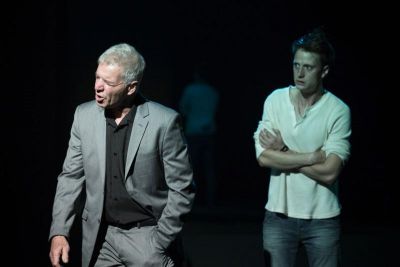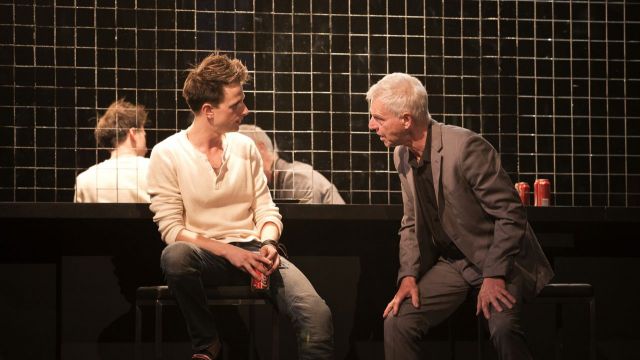Mortido
Mortido is a sprawling crime drama that critically examines all the sordid dealings inherent in the traffic and distribution of cocaine, as well as chronicling the human wreckage that occurs as a consequence of this, blazing a trail through the impoverished barrios of Mexico, the jungles of Bolivia, the gay nightclubs of Berlin, the cultural melting pot of modern Cabramatta and the sleekly manufactured, designer Shangri-Las of the Sydney yuppie jetset.
The narrative does not unfold in strict chronological order, rather the play shifts back and forth randomly, and sometimes quite abruptly, between timezones – in a manner somewhat reminiscent of the acclaimed British TV mini-series Traffik (1989) and Steven Soderbergh’s Hollywood remake, Traffic (2000).
 A small cast assume multiple roles with a chameleonic ease which is doubly impressive given they are tasked with plausibly playing characters at extreme opposite ends of this conflict. Colin Friels is equally convincing playing an affable Australian cop and an intimidating German drug lord. Renato Musolino is simultaneously repellent and pitiful as both a smugly affluent distributor and an impoverished junkie reduced to homelessness. Luisa Mignone plausibly conveys the strain of a criminal’s trophy wife struggling to maintain a “respectable” façade, but also excels as the shamelessly calculating middle-management employee of a drug cartel. Calin Diamond portrays both children of privileged upbringings and children of the street with an authenticity that is sometimes downright chilling in one so young.
A small cast assume multiple roles with a chameleonic ease which is doubly impressive given they are tasked with plausibly playing characters at extreme opposite ends of this conflict. Colin Friels is equally convincing playing an affable Australian cop and an intimidating German drug lord. Renato Musolino is simultaneously repellent and pitiful as both a smugly affluent distributor and an impoverished junkie reduced to homelessness. Luisa Mignone plausibly conveys the strain of a criminal’s trophy wife struggling to maintain a “respectable” façade, but also excels as the shamelessly calculating middle-management employee of a drug cartel. Calin Diamond portrays both children of privileged upbringings and children of the street with an authenticity that is sometimes downright chilling in one so young.
Tom Conroy (as rookie pusher, Jimmy) and David Valencio (as the ruthless heavy, El Gallito) are the only cast members not tasked with frequently switching between multiple personas – but they bring a frightening intensity to their scenes together, tangibly conveying a sexual attraction that overrides any instinct towards self-preservation or professional honour.
 Mortido never falls into the trap of glamorising the unprincipled choices of the various characters, but neither does it descend into preachy, PSA-style finger wagging. Angela Betzien’s dialogue is possessed of a rapier sharp wit, and moments of unexpected gallows humour abound. Production design is spartan, but Geoff Cobham’s meticulously nuanced lighting design, combined with the subtle shifts in Pete Goodwin’s score, serve to effectively establish each different scene. The director, Leticia Caceres, does an impressive job of thinking outside the sbox in terms of representing acts of sex n’ violence, as well as scenes involving animals, that would be impossible to stage in a literal manner, though they remain disturbing, despite being presented in an impressionistic fashion.
Mortido never falls into the trap of glamorising the unprincipled choices of the various characters, but neither does it descend into preachy, PSA-style finger wagging. Angela Betzien’s dialogue is possessed of a rapier sharp wit, and moments of unexpected gallows humour abound. Production design is spartan, but Geoff Cobham’s meticulously nuanced lighting design, combined with the subtle shifts in Pete Goodwin’s score, serve to effectively establish each different scene. The director, Leticia Caceres, does an impressive job of thinking outside the sbox in terms of representing acts of sex n’ violence, as well as scenes involving animals, that would be impossible to stage in a literal manner, though they remain disturbing, despite being presented in an impressionistic fashion.
Mortido is not a fun night out at the theatre; despite moments of effective comic relief, it is ultimately a depressing and pessimistic work. Also, though it strives to present shocking subject matter in a thoughtful and tasteful manner, its depictions of sex n’ violence are not for the squeamish. But if hard-hitting, edgy contemporary drama is what you’re after, it doesn’t get much better than this.
Benjamin Orchard
Photographer: Shane Reid.
Frank Hatherley adds his impressions of the Belvoir season:
 There can’t be many portraits of Sydney as heartless as this. Mortido ranges the Emerald City. From under the Coca-Cola sign in Kings Cross, to the high-class suburb of Woollahra, to the bedsit scrapings of Penrith, with a trip to the huge housing estate across the road from the Belvoir itself, and a quick call to the Liverpool Megacentre Food Court.
There can’t be many portraits of Sydney as heartless as this. Mortido ranges the Emerald City. From under the Coca-Cola sign in Kings Cross, to the high-class suburb of Woollahra, to the bedsit scrapings of Penrith, with a trip to the huge housing estate across the road from the Belvoir itself, and a quick call to the Liverpool Megacentre Food Court.
Not to mention various scenes in Berlin and, getting to the point of this junk-filled story, key moments in Bolivia. Angela Betzien’s dramatic story telling is exact and is directed by Leticia Caceres in forthright style. Her cast, doubling and trebling roles, revel in their ghastly and appalling work.
It was only in the second half that the fractured timeline becomes a problem. As the drugs take hold, what really happened to poor Jimmy (Tom Conroy) becomes more confused. Was there more than one trip to Bolivia? Surely his lover, the louring El Gallito (David Valencia), doesn’t live in Sydney?
The need to slip freely and often between scenes must have been a major headache for designer Robert Cousins. His all-black setting has certainly reduced the play’s scope.
No problems with the acting however, with top honours going to Colin Friels, outstanding as an easy-going Aussie cop, a vicious German-Bolivian villain, a Greek Australian ex-con and a Serbian Australian.
Pete Goodwin, of The Sweats, provides a vivid soundtrack throughout, including an ear-popping club scene. All lovers of modern theatre should attend. There were many seats available so early in the run.
Photo by Brett Boardman.
Subscribe to our E-Newsletter, buy our latest print edition or find a Performing Arts book at Book Nook.

